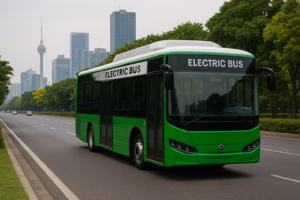Lahore (April 2025): The Government of Punjab has taken a groundbreaking step toward transforming public transportation by approving a large-scale electric bus network across the province. This initiative, led by Chief Minister Maryam Nawaz, aims to promote eco-friendly, affordable, and modern travel for millions of daily commuters in urban centers like Lahore, Rawalpindi, Faisalabad, and beyond.

Electric Mobility Takes Off in Lahore & Rawalpindi
Earlier this year, Punjab officially launched its first fleet of 27 electric buses in Lahore, operating on a 21-kilometer route from the Railway Station to Green Town. With top-notch features like free Wi-Fi, GPS tracking, USB charging ports, and disabled-friendly design, these buses have already begun serving over 17,000 passengers daily, marking a successful beginning to the province’s clean transport mission.
Following the success in Lahore, Rawalpindi has also been selected for a major electric bus rollout. A project worth Rs. 7 billion has been approved to bring in 102 electric buses across 10 major city routes, covering a total distance of 84 kilometers. The system is expected to be fully functional by November 2025.
A Province-Wide Green Transport Vision
But Punjab’s ambition doesn’t stop there. The government has set its sights on a province-wide electric mobility network, planning the introduction of up to 1,500 electric buses in the coming years. In addition, the plan includes the distribution of 20,000 electric bikes for students, professionals, and low-income commuters — a move that is both socially inclusive and environmentally responsible.
Another 657 urban eco-friendly buses are also in the pipeline for key cities including Faisalabad, Bahawalpur, Sargodha, Sialkot, Multan, and DG Khan.
Economic and Environmental Impact
This major transport overhaul is expected to significantly reduce urban pollution, curb greenhouse gas emissions, and improve the overall air quality in cities notorious for smog and vehicle congestion. The shift to electric transport will also reduce the fuel import bill and create new job opportunities in operations, maintenance, and infrastructure support.
“It’s not just a transport project — it’s a clean energy revolution,” a government spokesperson commented. “We’re building a future where public transport is efficient, affordable, and sustainable for every citizen.”
Challenges Ahead
Despite the optimism, experts point out a few challenges. The success of the project will rely heavily on building a robust charging infrastructure, ensuring regular maintenance, and training personnel in electric vehicle (EV) technology.
Nevertheless, with strong political will and public support, Punjab’s electric bus initiative could become a model for other provinces and a significant step toward a greener Pakistan.
Key Highlights:
-
1,500 electric buses planned across Punjab
-
27 buses currently operational in Lahore
-
Rs. 7 billion project approved for Rawalpindi
-
20,000 electric bikes to be distributed
-
657 additional eco-friendly buses for other cities
-
Fully functional systems expected by end of 2025
